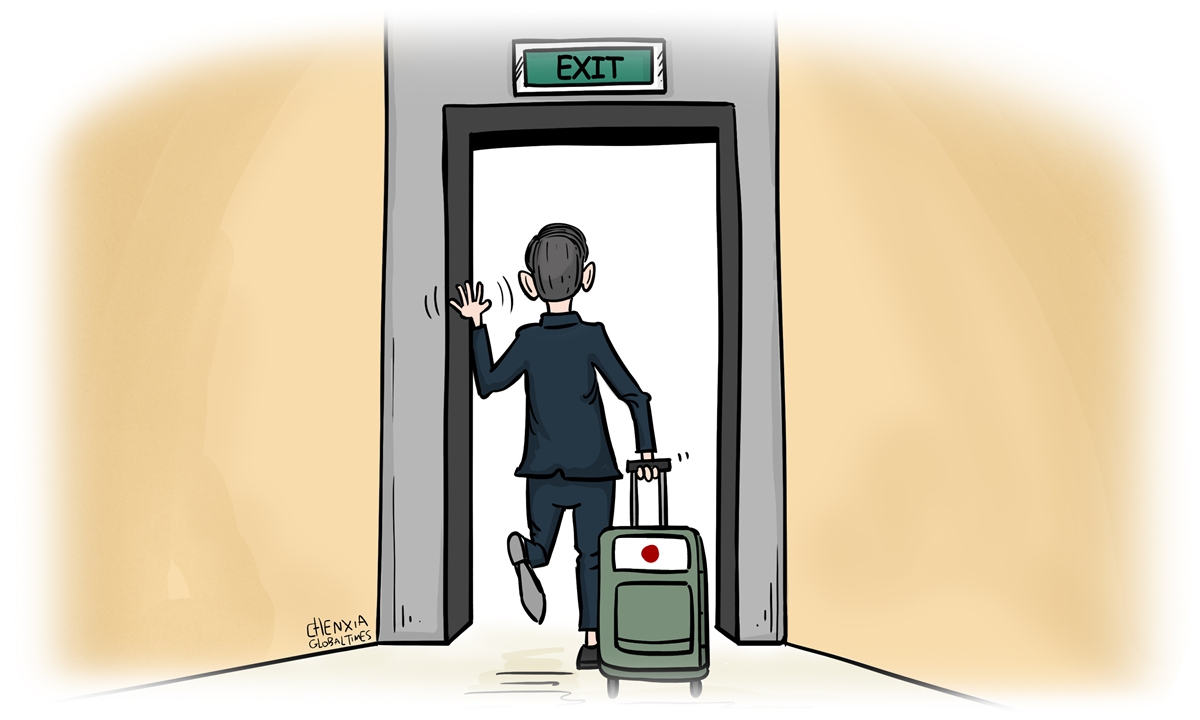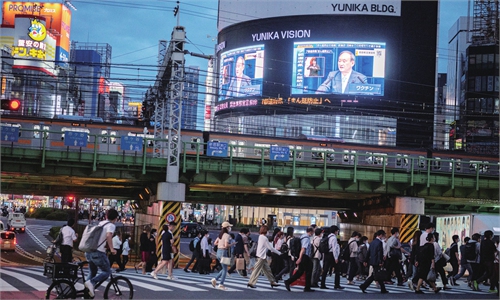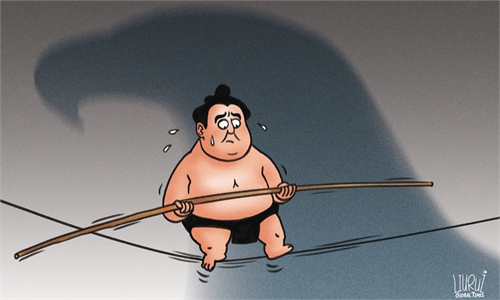Japan may enter political volatility after Suga's abrupt resignation
Japan may enter political volatility after Suga’s abrupt resignation

Illustration: Chen Xia/GT
Whoever succeeds Suga as Japan's next prime minister is to face the daunting task to stop the stagnant Japanese economy from sliding into another deep recession, to inspire adults of child-bearing age to give birth to more children and prevent Japan from becoming an aged society, and to take prompt and effective measures to contain the wildly spreading Delta variant of the coronavirus in the country - a major cause behind Suga's resignation.
The next prime minister will also need to strike a delicate balance of foreign relations involving Japan and the world's two largest economies, the US and China.
As the Biden administration is bent on launching a strategic competition to disrupt and slow down China's rise, Japan, an ally of the US but a close neighbor of China, will have to better position itself as its economy is intertwined with China's, and many of its companies will be left with idle redundant capacity if they lose access to the massive Chinese market.
To put it into perspective, a majority of American businesses, including manufacturers, services providers, banks, insurance companies and securities brokerages are requesting the White House make clear their China policy with US business in China seriously obstructed by Trump's punitive tariffs and Biden's increasingly restrictive high-technology export scrutiny. A majority of American companies know what the giant and still growing Chinese market means to them.
Four months ago, Suga flew to Washington and became the first foreign leader to hold an in-person summit with President Biden, who encouraged Suga to take a more confrontational attitude toward China. Suga seemed to have been persuaded, and suggested that Japan's military may assist the US troops to defend the island of Taiwan in case Beijing enforces the Anti-Secession Law and reunify the Taiwan Island with the mainland. Now, four months later, Suga is stepping aside.
Suga knows that he has become a liability to the LDP. There are signs that the largest political party in Japan is going to regain its majority in the diet, the lower house of Japan's parliament. But the LDP powerbrokers figure they will do better under a fresh face, rather than Suga who is wooden in public appearances and whose popularity has fallen to below 30 percent.
Suga fared badly over his handling of the latest flare-up of the Delta variant, also the largest wave of the virus since the pandemic began in Japan. The country, which has seen more than 1.6 million virus cases, has also been plagued by a slow vaccination rollout. Daily new infections have hit new highs, topping 25,000 cases per day. Virus hospitalizations are going up and Japanese hospitals are feeling the pinch.
The decision to host the Tokyo Olympic Games despite the worsening pandemic proved he is hugely unpopular. Critics have pointed to a shortage of Covid-19 hospital beds that left some sick people at home, despite warnings since last year that Japan needed to reorient its hospital capacity toward treating pandemic cases. Suga's weak and indecisive actions on containing the pandemic have made Japanese people disgruntled and the public basically does not trust his government at all, according to Japanese media commentators.
Suga's predicament and downfall was viewed in a favorable light by the stock market investors. Japanese shares rose sharply on his stepping aside, with the broad Topix stock index closing up 1.6 percent on Friday on his leaving. Tokyo's financial markets made gains last week on hopes for a fresh face leading the government.
In Suga's tenure, Japan-China relations worsened. He once questioned China's legitimate maritime claims in the South China Sea, which was seen as a malicious assault on and interference into China's internal affairs.
During their summit in Washington in April, Biden and Suga invoked the so-called Quadrilateral Security Dialogue (Quad) plan which also includes Australia and India. The Quad is a NATO-style grouping that seeks a tough and confrontational stance to countervail China's rising influence and prestige in Asia-Pacific and the world.
On Friday, in a phone conversation with Australian Prime Minister Scott Morrison, Biden affirmed his plan to hold another Quad meeting before the end of 2021 in Washington.
A growing number of military exercises have been held under the flag of Quad, including the latest Malabar naval drills off the coast of Guam in late August. Since 2015, Japan has consistently joined the naval exercises.
Facing this belligerence and hostility, China is likely to be forced to ramp up its military investment and armament modernization drive, rapidly building up globally advanced air force, navy, army and rocket forces.
In any conventional conflict, it is a prerequisite for the PLA to have the lethal force to wipe out the enemy's military bases, concentrated barracks and large vessels in a swoop. Owning this ability will be able to deter adversaries to militarily intervene in China's reunification cause or intrude into the country's territorial sovereignty.
The author is an editor with the Global Times. bizopinion@globaltimes.com.cn


